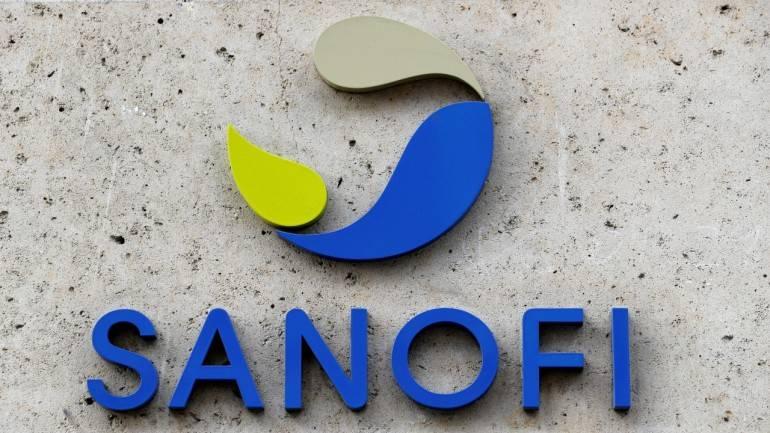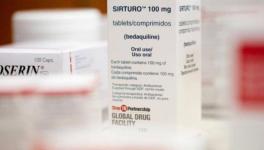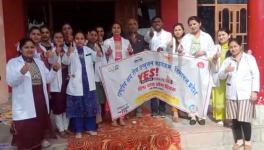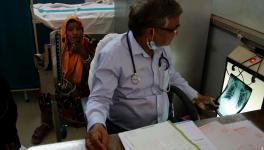Drug Giant Sanofi's Patent Claims on TB Drugs Faces Opposition

Image Courtesy: Money Control
French pharmaceutical giant Sanofi is trying to grab two patents over a combination of two drugs that are decades-old and used to prevent tuberculosis (TB) – part of the ‘evergreening’ and ‘thicketing’ strategies by big pharma companies to extend patents that keep drug prices high by prohibiting generic production within countries.
On November 5, Mumbai-based TB survivor and activist Ganesh Acharya and the Delhi Network of Positive People (DNP+) — an advocacy group for people living with HIV — filed pre-grant patent oppositions at the Indian Patent Office in Kolkata.
The two drugs in question are rifapentine and isoniazid, which have been approved and been on the market since 1952 and 1998, respectively. When combined in a fixed dose, isoniazid and rifapentine form the 3HP regimen, a preventive treatment for TB.
Also read: New Oral 3-drug Regimen for Drug-Resistant TB Must be Affordable: MSF
In 2016, Sanofi applied for patents on a fixed dose combination of these drugs formulated for adults, and a water dispersible child-friendly formulation of the two drugs designed for children. This preventive therapy is critical for vulnerable populations such as People Living with HIV (PLHIV) and children.
“PLHIV are 20 times more likely to get TB than the general population,” said DNP+ president Jai Prakash in a statement, adding, “Treating TB infection is a critical cog in the wheel to end AIDS.”
Just 17% of PLHIV who were newly diagnosed and enrolled into HIV care in India received this 3HP preventive therapy in 2018, while others received an older regimen that consists of isoniazid taken alone, as per the World Health Organisation (WHO). However, 3HP (isoniazid and rifapentine combined) is a shorter regimen with less liver toxicity than isoniazid taken alone.
If the pharma company patents these combinations of old drugs, it would severely impact the 3HP regimen’s availability and affordability as it would ban generic competition until 2033/2034.
Opposing the patents, and reminding that Sanofi’s patent claims are not a new invention but simply the combination of two existing drugs, DNP+ and Acharya argue they are expressly “aimed at blocking Indian generic manufacturers from entering the market and keeping control over the supply of new TB preventive therapies to TB and HIV programs.”
Along with support from the Third World Network, DNP+ and Ganesh Acharya seek to ensure that the Indian Patent Office correctly applies the patentability examination standards to reject Sanofi’s patent applications. “We have seen that nearly 70% of patents granted in India are bogus – they did not meet the criteria according to the Indian law,” Acharya said, “as a TB/HIV activist, I have to intervene before the patent office to ensure that public health is not compromised in the interest of big pharma. People are dying of TB in my city Mumbai.”
While isoniazid was never patented, the primary patent on rifapentine expired decades back. And the safety and efficacy of the 3HP regimen was first demonstrated in clinical trials that were primarily funded by public research networks.
Also read: India’s Production of Affordable Generic Drugs is Under Attack by the United States of America
“Rifapentine and isoniazid are public goods,” as Mike Frick, TB project co-director at Treatment Action Group, stated. “Sanofi is not the innovator behind rifapentine, but instead the beneficiary of public funding. The idea that the company is now seeking monopoly control over the combination of two decades-old medicines in the public domain shows that the patent system is broken; the idea of patents on combinations of medicines should be opposed,” he said.
As DNP+ president Jai Prakash said, “We cannot afford to allow frivolous patents to block generic competition that could further lower prices for improved TB prevention for kids and adults.”
Get the latest reports & analysis with people's perspective on Protests, movements & deep analytical videos, discussions of the current affairs in your Telegram app. Subscribe to NewsClick's Telegram channel & get Real-Time updates on stories, as they get published on our website.























